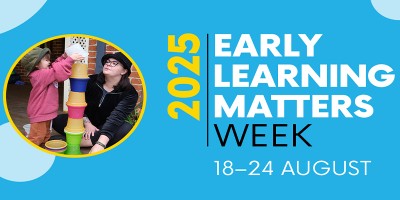High-quality early education and care is more than preparation for school—it’s the foundation for a child’s lifelong well-being, confidence, and achievement. During Early Learning Matters Week, educators, families, and communities come together to celebrate the transformative impact of play-based learning in shaping enthusiastic, capable learners.
Learning Through Play
Play is the natural language of children. It’s how they explore the world, test ideas, solve problems, and express emotions. In high-quality early learning environments, play is intentionally guided to support:
- Cognitive development and curiosity
- Language and communication skills
- Emotional regulation and resilience
- Social interaction and empathy
Educators use play to scaffold learning, observe emerging interests, and foster a sense of agency in children.
Building Confidence and Wellbeing
When children feel safe, valued, and supported, they thrive. Quality early learning settings:
- Promote secure relationships with educators and peers
- Encourage independence and decision-making
- Celebrate effort and creativity, not just outcomes
These experiences build confidence, self-esteem, and a strong sense of identity—critical foundations for well-being throughout life.
Achievement Beyond Academics
Early learning isn’t just about literacy and numeracy. It’s about nurturing the whole child. Research shows that children who attend high-quality early education programs are more likely to:
- Transition smoothly into school
- Develop positive attitudes toward learning
- Achieve academically and socially over time
A Collective Commitment
Early Learning Matters Week reminds us that early education is a shared responsibility. Families, educators, policymakers, and communities all play a role in ensuring every child has access to environments that support joyful, meaningful learning.
Reference:
Early Learning Matters Week







 As an Educator in Australia, your pay rate falls under the Children’s Services Award 2010. This award states the minimum amount that an employer can
As an Educator in Australia, your pay rate falls under the Children’s Services Award 2010. This award states the minimum amount that an employer can When working as a qualified Early Childhood Teacher (with a university degree) within a service, your rate of pay will come from the Educational Services
When working as a qualified Early Childhood Teacher (with a university degree) within a service, your rate of pay will come from the Educational Services When working as a Diploma Qualified Educator your pay rate is from the Children's Services Award 2010. This Award states your minimum rate of pay
When working as a Diploma Qualified Educator your pay rate is from the Children's Services Award 2010. This Award states your minimum rate of pay When working as a Cert 3 Qualified Educator, your pay rate is from the Children's Services Award 2010. This Award states your minimum rate of
When working as a Cert 3 Qualified Educator, your pay rate is from the Children's Services Award 2010. This Award states your minimum rate of Educational Leaders play a crucial role in their early childhood service by ensuring that the educational program aligns with best practices and supports the holistic
Educational Leaders play a crucial role in their early childhood service by ensuring that the educational program aligns with best practices and supports the holistic In early childhood education and care, ratios are more than a technicality—they are a frontline safeguard. Every child deserves responsive supervision, emotional connection, and developmental
In early childhood education and care, ratios are more than a technicality—they are a frontline safeguard. Every child deserves responsive supervision, emotional connection, and developmental With the new national child safety reforms kicking in on 1 September 2025, early childhood services like yours have a real opportunity to lead the
With the new national child safety reforms kicking in on 1 September 2025, early childhood services like yours have a real opportunity to lead the Here’s a comprehensive Mobile Phone and Smart Watch Policy tailored for early childhood education and care (ECEC) services in Australia, aligned with the latest 2025
Here’s a comprehensive Mobile Phone and Smart Watch Policy tailored for early childhood education and care (ECEC) services in Australia, aligned with the latest 2025 The Sea of Fish Challenge is a national initiative that invites children, educators, families, and communities to create and display fish artworks as a symbol
The Sea of Fish Challenge is a national initiative that invites children, educators, families, and communities to create and display fish artworks as a symbol Across the early childhood education and care sector, educators are sounding the alarm: current staffing ratios are insufficient to deliver safe, meaningful, and developmentally appropriate
Across the early childhood education and care sector, educators are sounding the alarm: current staffing ratios are insufficient to deliver safe, meaningful, and developmentally appropriate


